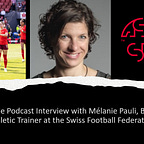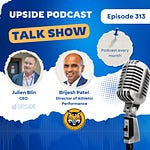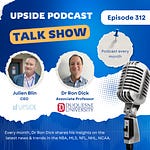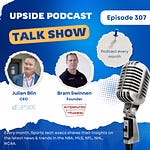This week we had the honor to interview Mélanie Pauli, BOP (Best Player on the Pitch) & Athletic trainer at the Swiss Football Association.
Show Notes: Through this interview, we touched on her background, her role at the Swiss Football Federation. We also touched on the importance of technologies in the world of women soccer, and the growing amount of interest for women's soccer around the world. We also discussed the great progress being made in the world of women sports and what type of product she would build if she had unlimited engineering and financial resources.
Best Quotes: Here are some of the key discussion points and best quotes from our conversation with Mélanie:
On her background:
“ I studied sports science in Switzerland in Lausanne. I worked as a sport teacher first and then in parallel I specialized myself in sports and performance, and in strength and conditioning. Then I created my own company, an athletic training center specialized in performance and rehabilitation and general population fitness (..) I worked for 10 years with individual athletes or professional teams across several sports, not just in soccer, but also in volleyball or in track and field and so on”.
On her role as athletic trainer at the Swiss Soccer Association:
“Then I got the opportunity in 2019 to join the Swiss Football Federation and especially the women department to help develop the performance aspect of the soccer women teams. Back then there was a gap so I have helped filled that gap. That’s what convinced me in this project. The goal was also to help reduce the injuries, with some specific developments. My goal was also to develop the physical structure (of players) and help develop the Federation”.
“My role at the Swiss Soccer Federation is quite diverse as I am involved in various things with the national women soccer team but also with the youth women national Swiss soccer team. I also support the coaches in terms of planning on and off the pitch at the academy that we have in Switzerland, but also with the soccer clubs in the first division. I help them adopt the right strategy and structure in terms of performance training. I also help in terms of recommendations especially when the coaches are trying to find solutions. I also try to use the synergies between the men and women teams”.
“First we focus on the clubs in the first division. And then we focus on the Youth teams because that's really important. And then we focus on the national soccer teams and we try to implement what we have learned in terms of the management of menstrual cycles, performance optimization, activation, regeneration, or injury prevention. We try to teach athletes and coaches how to use those strategies daily when they are with the national team as well as with their club in order to help them individualize their strategy and their routine”.
“I have been working with the Swiss Football Federation for the past two years. Our goal has been the European Women Soccer championships and we were just there in England for that competition. And our next goal is going to be to qualify for the next Soccer World Cup”.
On the importance of technologies like Orreco in her role and in women soccer in general:
“We use technologies and it's really important. We try to include them step by step, but it's so important for us to monitor the loads of athletes and try to individualize training more and more for our athletes. If you are in a team sports in 2022, it's about individualizing (training, recovery, treatment) for athletes”.
“Technologies are important for the monitoring of menstrual cycles and to track, report and understand the trends to help the women athletes develop their own strategy and routine. First we can monitor the pre symptoms to help minimize the stress on the body in order to help our athletes recover better”.
On how technologies and research provided by companies like Orreco are a game changer for the world of women sports:
“For me technologies like Orreco are a game changer. These types of technologies are the future of women sports, not just in soccer, but in women sports in general. Orreco is really pushing the boundaries in the world of research on women. And we need that because 97% of the published studies are made by the men and with the men”.
“So it's really important to understand the physiology of the woman and the influence of the hormone and menstrual cycles are part of that. But it's just one part of several different critical parts in the world of women sports”.
On the fact that technologies like GPS and HR monitoring systems are already being used by women pro soccer teams today:
“Technologies is like GPS or HR monitoring systems are commonly used in the world of pro women soccer. At the European women soccer championships, every team uses those types of technologies, and every Federation already invested in at least some GPS and tracking technologies”.
On the need to better monitor and understand women athletes’ menstrual cycles:
“However when it comes to monitoring the menstrual cycle of women athletes it is not widely used by teams but we are talking more and more about this topic”.
“There are still a lot of questions about how to manage menstrual cycles and how to take than into consideration into the practice and training within a team. I'm speaking with a lot of athletic coaches and there are a lot of men in this profession and this topic is also sometimes taboo so I can help break the ice to speak about this”.
On the great progress being made in the world of women's sports:
“And a lot of it has to do with the fact that the US women soccer team was very vocal about it (..) So I think by being more vocal, you get the attention of the general public and the authorities and Federations have to do something about it because there's more pressure on them now to do something about it”.
“And I think it's a big step to also push the other Federations in the world to think about it, to reflect about it so they can ask themselves: What about us? What are we doing to help? We need some row models, and we need someone to inspire us”.
“And I think that equal pay between women athletes and men athletes is an extremely important point, but in my opinion, it's more than that. When we speak about equal pay, we have to be careful. I think we should speak about not just about equal pay, but more about equal chances in terms of development or structure”.
On the type of product she would build if she had unlimited engineering and financial resources.
“ I would focus on women research because I'm involved in the athletic and performance part. We need to better understand the physiology of women athletes to be able to better help women athletes and create much more individualized programs to help women athletes with injury prevention. So we need to really push the startups and engineers to focus on that. When it comes to monitoring, what can we do to optimize the performance of women athletes, or better prevent injuries? These are the types of questions we need to focus on”.
You may also like:
🔮 2022 Upside Top Sports Tech Predictions (NFT/Metaverse, Sports Performance, IPOs/M&As..)
🔗 🔥 Upside Analysis: NFTs Vs Crypto Vs Digital Currency, How Are They
Different?
🔥 Upside Chat: Dave Hancock, CEO, Apollo (Leading Athlete Management Systems (AMS) vendor)
🔥Upside Chat: Alexi Pianosi, Strengths and Conditioning Coach, Pittsburgh Penguins (NHL)
🔥Upside Chat: Pierre Barrieu, High Performance Director, Toronto FC (MLS)











